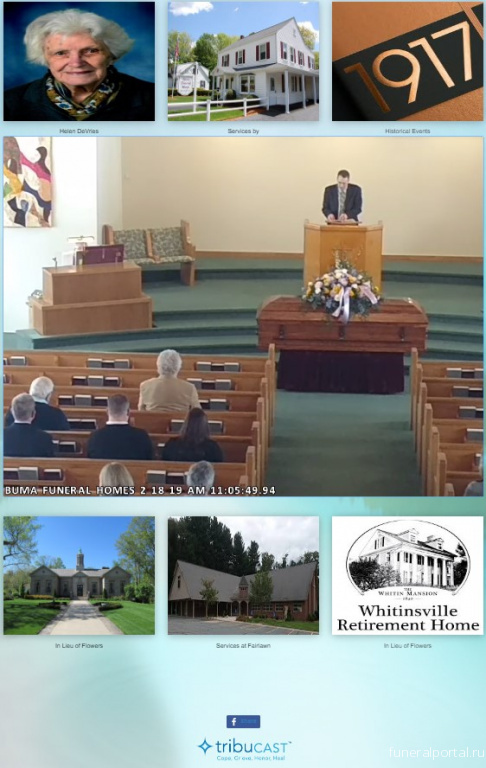By: Linnea Crowther
As the new coronavirus strain COVID-19 travels around the globe, it’s not always easy to know what to do to keep ourselves and our loved ones safe. In many areas of the U.S., public gatherings have been banned or discouraged. We're practicing social distancing, staying home as much as possible.
Meanwhile, life goes on — and life includes all the everyday deaths that happen from all the regular everyday causes. But now, everyday deaths raise the question: What do current health precautions during the coronavirus epidemic, such as limiting or restricting large public gatherings, mean for holding a funeral?
Here are several options that families and funeral professionals are currently employing to make it safer for families to mourn and grieve at a time when communities worldwide are being encouraged not to engage in unnecessary close contact.
Livestream funerals so people can attend remotely
One option available to families right now is streaming live video of the funeral online. This is a flexible solution that allows you to have the closest immediate family members at the funeral service in person, if you wish, while other people participate from home.
Bruce Likly is the president of TribuCast, a company that provides technology for streaming funerals. Their service has been around since well before anyone ever heard of COVID-19, but it will surely be increasingly useful now for anyone who can’t get to a funeral because they are quarantined, are uncomfortable with traveling long distance, or any other reason.
“We have to be able to grieve and mourn collectively, even though we’re not in the same place at the same time,” Likly says. TribuCast offers options for friends and family to watch the funeral remotely on their own devices — and to participate, too. Live chat can be included for anyone who may not have a webcam at home but still wants to be actively involved in the funeral service. Multimedia offerings can be provided to remote attendees, including the funeral program, written eulogy, and family photos and videos.
Walker Posey, a funeral director at Posey Funeral Directors in North Augusta, South Carolina, as well as spokesman for the National Funeral Directors Association, has been offering streaming funerals to local families for 10 years. He appreciates the technological advancements that have made it possible for anyone to attend a funeral, even if they can’t be there in person. “Today, it’s even easier,” he says, “because with our mobile devices, you can really watch from anywhere.”
Bob Gordon, president and CEO of Cypress Lawn Cemetery Association in Colma, California, says he and his funeral directors offer streaming of every single funeral they arrange. It's useful right now, and it will contine to be useful to people who can't make it to a funeral for whatever reason. Gordon explains how positive online funerals are for anyone who can't be there in person: "You may be sitting in your living room, shedding a tear, remembering the good times you had with that person or what that person taught you, good and bad, and then being able to let that person go."
Likly has seen plenty of funeral services where there are many remote attendees. He recalls one that had only 20 or 25 mourners at the funeral home, while close to 50 attended remotely. The family set up the remote attendance option specifically for an aunt of the deceased who was far away and unable to travel, but they discovered as they spread the word about the remote option that many people were excited to be able to use it.
If you’re planning a funeral at a time like now when public gatherings are discouraged or restricted, ask your funeral director about remote options. If they’re not already offering the service, a company like TribuCast can help them get set up with it easily and quickly. Or you may take a more DIY approach and have someone on site with a webcam invite remote mourners to join, using a common videoconferencing app like Google Hangouts or Zoom.
This is technology that’s useful any time, but right now, it can give families peace of mind that they can still gather to mourn together, even if it’s only a virtual gathering.
Opt for outdoor locations
Many experts are recommending that you stay at least six feet apart from others to ensure you’re not affected by a cough or sneeze.
If having a group of mourners together in person is important for you, but it's risky for health reasons to put them all together in a crowded room, Posey suggests an alternative: “We can have more graveside events, so you’re not confined in a building, but you’re outside, where it’s a little bit less contact.”
You can take this idea beyond the graveside, as well. If you want to hold a memorial service with no body present, consider that a public park, outdoor worship area at your church, or beach could be a better location for a memorial service offering a less confined experience.
The larger the outdoor area you choose, the easier it is for attendees to avoid close contact.
Postpone services until later
For some families, the right decision will be to plan a memorial service for a later date. You can do this whether you plan to have the body cremated or buried. If you’re planning on burial, you might choose to have a small, private graveside service at the time of burial, with just your closest family members in attendance. Then you can plan a larger public memorial service for later, when it’s safer to gather publicly.
For a cremation, you can have a small, private family gathering at the crematorium or funeral home if you wish, or you can skip that step and simply plan for a later memorial service. You might like to have the ashes displayed in an urn at the service.
When should you plan the service for? At this point, it’s hard to say. Scientists say it’s too early to know whether the spread of coronavirus will subside like flu in the warmer months of the year. You might consider tentatively planning memorial services for a summer date, while remaining flexible regarding rescheduling if we get near that date and public gatherings still don’t seem like a good idea. Or you might just let family and friends know that there will be a memorial service at a date to be determined, then play it by ear as the situation develops.
Keep contact to a minimum
If you’re in an area that hasn’t been hit hard by COVID-19, you may find people continuing with funeral plans as normal. But you can still help keep the spread of the virus to a minimum if you encourage funeral attendees to express their love and sympathy without any physical touching.
One family did that right in their loved one’s obituary, asking attendees to “refrain from hugging, kissing and shaking hands during tomorrow’s ceremonies. A simple smile and nod of expressed sympathy will be all that is required.” It’s a great way to set expectations for the funeral so no one needs to feel awkward if they prefer to avoid a kiss or handshake.
Another family that's postponing services for their loved one used her obituary to offer some words of advice on how to get through this hard time with love and compassion: “telephone your friend to offer words of love and support and a virtual hug, drop something delicious by the house for a very brief visit, leave a condolence on the funeral home website, send a card or have a Mass said in their memory, remain in touch and above all else… say prayers for the deceased and their family and the world during this difficult period.”
Don’t skip the funeral entirely
Whichever approach seems best for your family, experts on grief and mourning say that it’s important for the surviving loved ones to hold some sort of grieving ritual, rather than avoiding a funeral completely.
“The gathering is really the important part about the funeral ceremony, because you feel the support of your community around you,” Posey says. “Whether it’s large or small, families need to feel supported by their communities.” That support can come through crystal clear via a remote connection, if an in-person gathering is impossible or unwise. And if postponing the memorial service is your choice, the support will be waiting for you when it’s time to gather.
Likly agrees. “People go to funerals clearly in pain, and as they go through the process of congregating with loved ones, and share stories and religion as appropriate, they come out the other end transformed. They move from crying to laughing about good times and being given permission to celebrate those good times.”
You should be prepared for the probability that if you're planning a funeral in the near future, your funeral director will bring up COVID-19. “When we’re talking to families,” Gordon says, “we ask the questions just to get it out in the open: Has anyone been traveling abroad in your family? Do you have any family members that may be at risk to come to a group event? It’s the right thing to do.” It's not intended as a scare tactic. Instead, your funeral director is taking necessary steps to keep your family and community as safe as possible.
Whatever solution feels right for your family, know that your funeral director wants to help you make it happen. “I hope that folks know that although there’s a lot of fear around public spaces and gatherings,” Posey says, “there are ways to still make those gatherings meaningful. Funeral homes across America will not stop serving families just because of this virus.”
How to inform friends and family of your plans
Whatever you decide is the best option for your loved one’s funeral, you’ll want to make sure anyone who needs that information can find it.
The obituary is typically the official source of funeral details, as well as the written tribute to your loved one’s life story. Families link to the published obituary from their social media and direct messages, so that people can always refer back to it. Traditionally, families have made sure their hometown communities have seen the obituary by publishing it online permanently through their local newspaper. In some cases, they just publish it temporarily at the funeral home website.
If you’re planning on offering remote access to the funeral, you can note in the obituary how family and friends can get that access. Or if you’re postponing services until a later date — or a date to be determined — you can say that in the obituary, too. If you're having just a small gathering of close family right now, you should consider omitting the time and location from the obituary, saying that services will be private.
If you already planned a service that you later decide needs to be changed, you can put that new information in the obituary, too, by updating the online version. If you need to make a change to an online obituary (or publish a new print obituary), you should contact the newspaper you placed it in. For contact information for local newspapers nationwide, check here.








